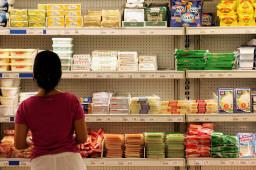Supermarkets are changing their stocking habits to suit the needs of Italy's seven million singles, Italian farmers' union Coldiretti said Friday.
Issuing the report on the feast of St Faustino, the saint of lonely hearts, Coldiretti said that the nation's singles were responsible for a boom in the sales of farm products in mini-portions and ready-to-use packages.
''Singles represent a section of the population who need to save time because their lifestyles centre around work and recreation, but they do not want to give up on the consumption of fresh produce,'' the union said.
Among the single-friendly products that have recently appeared on supermarket shelves are baby watermelons weighing around two kilos in place of monster 10-kilo fruit, parmesan cheese in 25-gram packages, eggs sold in twos and fours instead of the traditional dozen, and packaged trays of mixed fruit - for example, an apple, a pear and a kiwi.
According to Coldiretti, the nation's singles are responsible for the boom in sales of bags of ready-chopped, ready-washed vegetables, which national statistics bureau Istat put in the shopping basket it uses to calculate the cost of living for the first time this year after consumers spent 350 million euros on 40 million kilos of the stuff in 2007.
The farmers' union also noted increases in sales of 80 gram ready-meals of pre-cooked pasta and sauce for heating in the microwave, and in sales of foodstuffs for quick meals such as sliced meats, grated carrots, and cubes of pancetta and grated cheese for making a speedy carbonara.
''But all this has a cost, and shopping expenses for singles are hitting new highs,'' warned Coldiretti.
In the case of prepackaged vegetables, the average price is around 8 euros a kilo - almost six times that of the same product sold loose, the union said.
Istat calculates that people living on their own account for just over a quarter of Italian households, or around 5.9 million.
Singles spend a total of around 1,614 euros a month each, and while a third of this goes on housing costs at least 18.5% is spent on food shopping.













